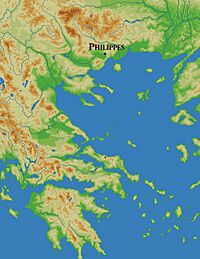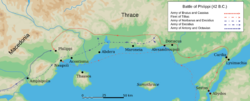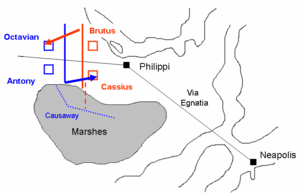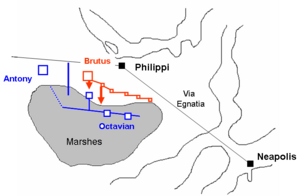Battle of Philippi facts for kids
Quick facts for kids Battle of Philippi |
|||||||
|---|---|---|---|---|---|---|---|
| Part of Liberators' civil war | |||||||
 Location of the Battle of Philippi |
|||||||
|
|||||||
| Belligerents | |||||||
| Second Triumvirate Supported by: Ptolemaic Egypt (sent ships but too late to aid in the fighting) |
Rebels Supported by: Parthian Empire (cavalry force) |
||||||
| Commanders and leaders | |||||||
| Mark Antony Octavian |
Brutus † Cassius † Allienus (unknown) Serapion (retreats to Tyre) |
||||||
| Strength | |||||||
| 53,000–108,000
40,000–95,000 infantry in 19 legions 13,000 cavalry |
60,000–105,000
40,000–85,000 infantry in 17 legions 20,000 cavalry |
||||||
| Casualties and losses | |||||||
| 16,000 killed (3 October) | 8,000 killed (3 October) Surrender of entire army (23 October) |
||||||
| Total dead: 40,000 | |||||||
The Battle of Philippi was a huge fight in 42 BC near the city of Philippi in Macedonia, which is now part of Greece. It was the final battle in a civil war that followed the murder of Julius Caesar.
On one side were Mark Antony and Octavian, who were part of a powerful group called the Second Triumvirate. They wanted to get revenge for Caesar's death. On the other side were Brutus and Cassius, who had led the group that killed Caesar.
This battle was one of the biggest in Roman history, with up to 200,000 soldiers fighting. It actually happened in two main parts. The first fight was in early October. Brutus fought Octavian, and Antony fought Cassius. Both sides struggled with their soldiers not following orders well.
In the first part, Brutus pushed back Octavian's forces and even took their camp. But on the other side, Antony defeated Cassius. Cassius sadly took his own life because he thought Brutus had also lost. Brutus then gathered Cassius's remaining soldiers, and both armies went back to their camps. This first battle was pretty much a tie.
The second fight happened on October 23. This time, Brutus's army was completely defeated after a very tough battle. Brutus also took his own life. This victory meant that Antony and Octavian now had full control of the Roman Republic.
Contents
Getting Ready for Battle
After Julius Caesar was killed, Brutus and Cassius, who were called the "Liberators," left Italy. They took control of all the eastern parts of the Roman Empire, from Greece to Syria.
Back in Rome, three powerful leaders who supported Caesar – Antony, Octavian, and Lepidus – formed the Second Triumvirate. They controlled most of the Roman army in the west. Their main goal was to defeat the Liberators and get revenge for Caesar's death.
Antony and Octavian decided to take their best soldiers, about 28 legions, to northern Greece. They sent a smaller group ahead to scout for the Liberators' army. This scouting group found a good defensive spot near the town of Philippi.
The Liberators didn't want to fight a big battle right away. Instead, they wanted to find a strong defensive spot and use their powerful navy to stop Antony and Octavian from getting supplies from Italy. They had spent months taking money from Greek cities to pay for their war.
Brutus and Cassius gathered their armies in Thrace. They were able to get around the scouting group of Antony and Octavian, forcing them to retreat. This allowed Brutus and Cassius to set up their forces on high ground near the Via Egnatia, a major Roman road.
They built strong walls and ditches to protect their positions. Brutus set up his camp to the north of the road, and Cassius was to the south. When Antony and Octavian arrived, they set up their camps facing the Liberators.
Who Fought in the Battle
Antony and Octavian's Army
Antony and Octavian had 19 legions ready for the battle. A legion was a large unit of the Roman army, usually with thousands of soldiers. Most of their legions were almost at full strength.
They also had a large group of 13,000 horsemen, called cavalry, who were their allies.
The Liberators' Army
Brutus and Cassius had 17 legions. Not all of them were at full strength, but they had extra soldiers from their allies in the eastern kingdoms. In total, they had about 80,000 foot soldiers.
They also had 20,000 horsemen, including 5,000 archers who fought on horseback. Many of these soldiers were experienced fighters who had served under Caesar before.
The Liberators knew that some soldiers might not want to fight against Caesar's heir, Octavian. So, Cassius gave strong speeches and also gave each soldier a lot of money to make sure they stayed loyal.
Historians believe that both armies had a similar number of soldiers, probably around 40,000 to 50,000 legionaries each. It would have been very hard to feed and supply more soldiers than that for months.
The First Battle
Antony tried many times to get the Liberators to leave their strong defensive position, but they wouldn't. So, Antony tried a secret plan: he started building a path through the marshy land to get around the Liberators' southern side.
Cassius eventually noticed this. He moved some of his army into the marshes and built a wall to stop Antony. This led to a big fight on October 3, 42 BC.
Antony attacked Cassius's defenses. At the same time, Brutus's soldiers, without waiting for orders, charged at Octavian's army. This surprise attack worked perfectly! Octavian's troops ran away, and Brutus's men captured their camp.
Octavian himself was not found in his tent. Some say he had a dream that warned him to be careful that day. Others say he hid in the marsh.
However, on the other side of the road, Antony successfully broke through Cassius's defenses and easily took Cassius's camp. It seems that part of Cassius's army had moved south, and when they tried to come back, Antony easily pushed them away.
The battle ended up being a draw. Cassius lost 8,000 men, and Octavian lost about 16,000. The battlefield was so big and dusty that neither side knew what was happening on the other side.
Cassius went to the top of a hill, but he couldn't see what Brutus was doing. Believing he had lost badly, he ordered his servant to kill him. Brutus was very sad when he found Cassius's body, calling him "the last of the Romans." He didn't have a public funeral for Cassius, fearing it would make his soldiers lose hope.
Some historians say that Brutus's soldiers started looting Octavian's camp too early. This gave Octavian's troops time to regroup and fight back, which stopped Brutus from winning completely.
The Second Battle
On the same day as the first battle, the Republican navy (Brutus and Cassius's side) managed to sink ships carrying more soldiers and supplies for Antony and Octavian. This made Antony and Octavian's situation dangerous because they were running out of supplies.
Brutus, however, could easily get supplies from the sea. Antony and Octavian had to send a legion to get more food. They also promised their soldiers more money to keep their spirits up.
On the other side, Brutus's army had lost its best military thinker, Cassius. Brutus had less experience and couldn't command the same respect from his allies and soldiers. He did offer his soldiers more money after the first battle.
Over the next three weeks, Antony slowly moved his forces around Brutus's army. He took control of a hill near Cassius's old camp, which Brutus had left unguarded.
To avoid being surrounded, Brutus had to spread out his army and build more forts. He still held the high ground and wanted to stick to his plan of avoiding a big fight, hoping that Antony and Octavian would run out of supplies.
However, his officers and soldiers were tired of waiting and demanded another battle. Brutus might have worried that his soldiers would leave if they thought he was losing courage. He also didn't know that Antony and Octavian's supplies had been cut off at sea.
When some of his allies started leaving, Brutus was forced to attack on the afternoon of October 23. He felt like he was being forced to fight, rather than choosing to. But the truth was, Brutus had no choice. If Antony and Octavian kept spreading out, they would cut off his supply route and trap his army against the mountains.
The battle that followed was a fierce fight between two armies of experienced soldiers. They fought very closely with their swords, and many soldiers were killed. They didn't use many arrows or javelins; they just charged at each other.
Brutus's forces fought well on their left side, pushing back Antony and Octavian's left wing. But Brutus's right side was weaker because he had spread his soldiers too thin. Antony and Octavian broke through this weak spot.
They then attacked Brutus's army from the side and behind. Brutus's soldiers were slowly pushed back. They couldn't keep their lines together and started to run. Octavian's soldiers even captured the gates of Brutus's camp before his army could reach safety.
Brutus's army was completely defeated. Brutus managed to escape to the nearby hills with only a few legions. Seeing that he would be captured, Brutus took his own life.
The exact number of soldiers killed in this second battle is not known, but it was likely very high for both sides because of the close fighting.
What Happened Next
Plutarch, an ancient historian, wrote that Antony showed respect for Brutus's body by covering it with a purple cloak. Antony remembered that Brutus had insisted that Antony's life be spared when Caesar was killed.
Many other young Roman noblemen died in the battle or soon after. Some nobles who escaped surrendered to Antony and joined his service. They didn't want to deal with the young and harsh Octavian.
The remaining soldiers from the Liberators' army, about 14,000 men, were taken into Antony and Octavian's army. Old soldiers were sent back to Italy, but some stayed in the town of Philippi, which became a Roman colony.
Antony stayed in the East, while Octavian went back to Italy. Octavian had the difficult job of finding land to give to all the soldiers who had fought for them. Even though some enemies still remained, the Republican resistance was completely crushed at Philippi.
The Battle of Philippi was the peak of Antony's career. At that time, he was the most famous Roman general and the most important leader of the Second Triumvirate.
Famous Sayings and Stories
Plutarch tells a famous story that Brutus saw a ghost a few months before the battle. The ghost said, "Thy evil spirit, Brutus: I shall see thee at Philippi." Brutus saw the ghost again the night before the battle. This story is very famous in Shakespeare's play Julius Caesar.
Plutarch also wrote down Brutus's last words, which came from a Greek play: "O wretched Virtue, thou wert but a name, and yet I worshipped thee as real indeed; but now, it seems, thou were but fortune's slave."
Augustus (Octavian's later name) wrote his own version of the battle: "I sent into exile the murderers of my father, punishing their crimes with lawful tribunals, and afterwards, when they made war upon the Republic, I twice defeated them in battle."
See also
- List of Roman wars and battles
 | Aaron Henry |
 | T. R. M. Howard |
 | Jesse Jackson |




